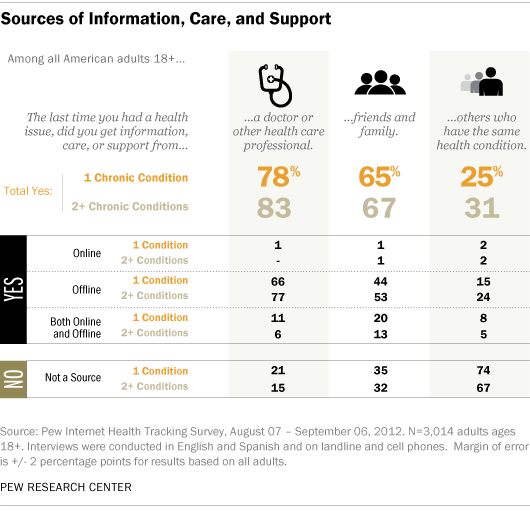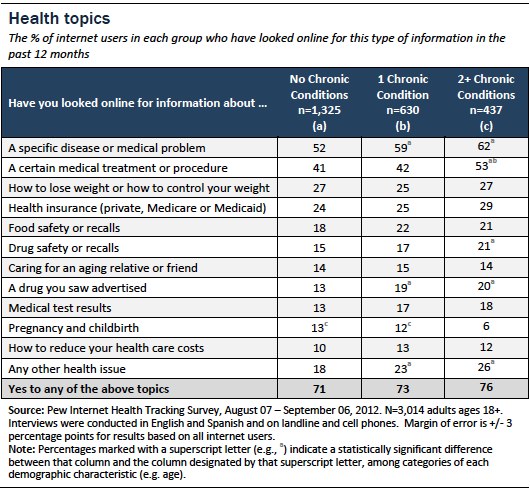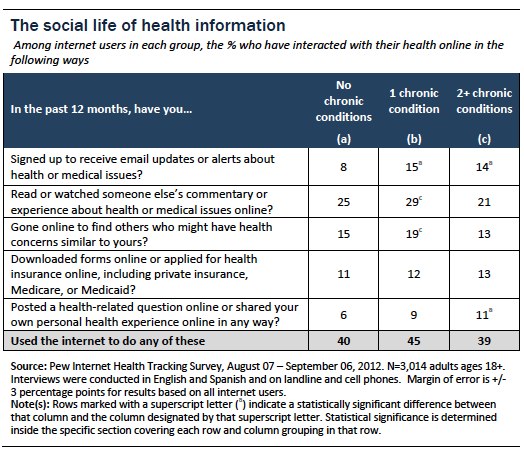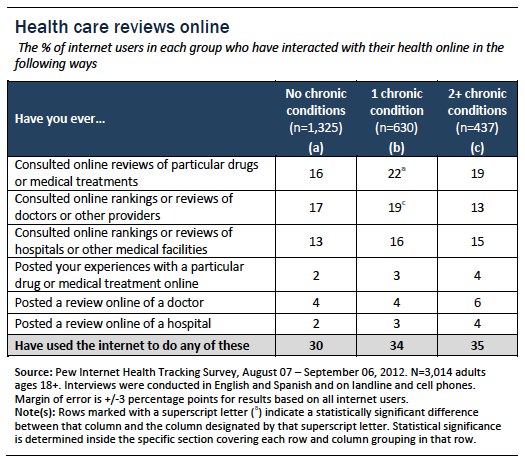Clinicians are a central resource, but friends, families, and peers play important roles, too
People living with chronic conditions are more likely than other adults to tap into every health information resource available to them, online and offline. When asked to think about the last time they had a serious health issue and to whom they turned for help:
- 81% of all adults living with one or more chronic conditions got information, care, or support from a doctor or other health care professional.
- 65% of all adults living with one or more chronic conditions got information or support from friends and family.
- 27% of all adults living with one or more chronic conditions got information or support from others who have the same health condition.
By comparison, people who report having no chronic conditions are significantly less likely to turn to each of these sources:
- 62% of all adults who report no chronic conditions got information, care, or support from a doctor or other health care professional.
- 56% of all adults who report no chronic conditions got information or support from friends and family.
- 23% of all adults who report no chronic conditions got information or support from others who have the same health condition.
When controlling for other demographic characteristics, such as age, education, ethnicity, and overall health rating, having a chronic condition significantly increases the likelihood someone got information or support from each of the three sources.
People who report having two or more conditions are more likely than those who report one condition to have called on a clinician or peer patient, as shown in the following table:

Once online, people living with chronic conditions are likely to access health information of all kinds
Seven in ten internet users, no matter their diagnosis, say they have looked online for health information in the past year. Internet users living with multiple chronic conditions are significantly more likely than other internet users to have looked online for information about a specific disease or medical problem, a certain medical treatment, and drugs, as shown in the table below:

Eight in ten U.S. adults who have sought health information online say they began their last inquiry at a general search engine like Google, Bing, or Yahoo. This has been a bedrock finding of the Pew Research Center, dating back to our first health survey in 2000, underlining the centrality of search in Americans’ online lives.
Internet users living with two or more chronic conditions are somewhat less likely than those who report no conditions to say this however: 68%, compared with 80%. Internet users who report two or more chronic conditions are more likely than other people to say they started their most recent health search at a site that specializes in health information, like WebMD: 20% say that, compared with 12% of internet users who report no conditions.
In order to get a better idea of how people are navigating health online, we asked respondents to tell us in their own words which sites or services they use. Federal government health websites were popular among those living with chronic conditions, such as PubMed, CDC.gov, Medline, HHS.gov, and Medicare.gov. Health insurance websites, clinicians’ websites, as well as some specific services like iTriage were also frequently mentioned by people living with chronic conditions.
Even search itself turns out to be a social activity. Half of all health searches online are performed on behalf of someone else, including among people living with chronic conditions who probably have quite a few of their own concerns. This is another bedrock finding of the Pew Research Center, dating to the year 2000, when we first began measuring Americans’ use of the internet to gather health information. Fifty-three percent of online health information seekers living with one or more chronic conditions report that the last time they went online for health information it was related, at least in part, to someone else’s medical situation. Forty-three percent of health information seekers living with chronic conditions say their last inquiry was about their own concerns, compared with 36% of those who report no conditions.
Few pay for online content
Thirty percent of online health information seekers living with chronic conditions say they have been asked to pay for access to something they wanted to see online. Eighty percent of those who encountered a pay wall say they tried to find the information somewhere else; 17% gave up; and 2% paid the fee.
By comparison, 23% of online health information seekers who report no chronic conditions say they have been asked to pay for access to information they wanted to see – a significant difference compared with those living with chronic conditions. Again, the vast majority (86%) say they did not pay, but rather tried to find the same information somewhere else. Ten percent gave up and 3% paid.
Sharing stories, finding other people who share the same health concerns
The internet enables people to not only gather health information, but to share it and even create it. We find that, in general, internet users living with chronic conditions are about as likely as those who report no health issues to say they have taken part in social activities related to health, as shown in the table below.

Internet users living with chronic conditions stand out from their peers in noteworthy ways: sharing questions online and reading or watching other people’s health stories online. Of those who have posted health questions online, eight in ten say they were hoping to reach a general audience of friends and other internet users, compared with just one in ten who say they hoped to get feedback from a health professional. Peer advice trumps professional advice in certain situations, as previous research has shown.9
When we control other demographic factors, such as age, income, education, race, and overall health rating, we find that having a chronic condition significantly increases the likelihood that someone will take part in any of the following activities: downloading forms, posting comments, reading or watching someone else’s commentary or experience about health, and signing up for email updates.
People living with chronic conditions are more likely than others to fact check what they find online with a medical professional
Thirty-one percent of U.S. adults living with one or more chronic conditions say they have gone online specifically to try to figure out what medical condition they or someone else might have. By comparison, 38% of U.S. adults who report no chronic conditions say they have done so. This difference is related to the fact that people living with chronic conditions are less likely than other adults to have internet access. When we look only at internet users, the two groups are equally likely to say they have gone online for a diagnostic check.
Among online diagnosers, people living with one or more chronic conditions are more likely than others to say that the information they found online lead them to think that it needed the attention of a doctor or other medical professional: 53%, compared with 41% of those living with no chronic conditions.
Among online diagnosers, people living with chronic conditions are also more likely to say they talked with a medical professional about the information they found online: 60% of online diagnosers with one or more chronic conditions did so, compared with 48% of those who report no conditions. And 48% of online diagnosers with one or more chronic conditions say that a medical professional confirmed their suspicions, either completely or in part. Twenty-one percent of online diagnosers with one or more conditions say a medical professional offered a different opinion, in contrast to the information found online. Twenty-seven percent of online diagnosers with one or more conditions say they did not visit a medical professional in order to get their opinion.
Again, the diagnosis difference likely plays a role: People with serious health concerns are likely to take their online research seriously.
Health care reviews are not a mainstream information source
People who consult online health care reviews are in the minority—and the numbers shrink even more when we ask if people have contributed to such reviews. Expressed as a percentage of the total population, for example, just 11% of U.S. adults living with one or more chronic conditions have consulted online rankings or reviews of hospitals or other medical facilities. This is the same percentage of U.S. adults who report no conditions who have looked online at hospital rankings and reviews.
The table below shows the percentages of internet users in each group who have consulted or contributed to online rankings or reviews of health services or treatments.





